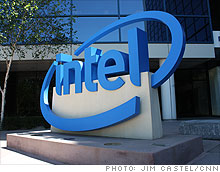Why the EU goes after U.S. companies
With its record $1.45B fine against Intel for allegedly anticompetitive activities, the EC is again showing its appetite for taking on big American corporations.

PARIS (Fortune) -- With its record $1.45 billion fine levied against Intel for allegedly anticompetitive activities, the European Commission -- the executive arm of the European Union -- is again showing its appetite for taking on and punishing big American companies.
The Intel case comes on the heels of a nine-year battle between the Brussels-based Commission and Microsoft (MSFT, Fortune 500), which ended last year with the U.S. firm being hit by two fines, of $680 million in 2007 and $1.2 billion last year, for abusing a monopoly position. Other big firms that have felt the commission's bite are Mastercard (MA, Fortune 500), which was ordered in 2007 to drop its card fees, and General Electric (GE, Fortune 500), which was blocked from merging with Honeywell in 2001.
So why is the European Commission going after U.S. firms in the first place? The short answer is: because it can; because it's being encouraged to do so -- and because it's a lot easier to take on big and ugly Americans than it is to crack down on abusive corporate behavior closer to home.
Because it can. On most policy issues, the European Commission's clout is actually quite limited. The European Union isn't a federal body with a single government, but rather a collection of nations that have pooled some of their sovereignty. So for the most part, it's national governments who call the shots in the EU. But there are a few areas where the commission does have powers to act on behalf of all 27 member states: international trade is one area; antitrust is another. In the case of both Intel and Microsoft, the commission argues that the two companies' behavior affected consumers and competitors across Europe.
Because it's being encouraged to do so. Intel (INTC, Fortune 500) and Microsoft's rivals in the U.S. and elsewhere have been more than happy to help the EU construct the antitrust cases. A bevy of firms including Yahoo, Time Warner's AOL, Fujitsu and Nokia contributed to the attacks on Microsoft, and even Google (GOOG, Fortune 500) has said it wants to join in. In Intel's case, competitor AMD (AMD, Fortune 500) has spent heavily to take its case to the European authorities, and greeted the ruling with glee.
"After an exhaustive investigation, the EU came to one conclusion -- Intel broke the law and consumers were hurt," said Tom McCoy, AMD executive vice president for legal affairs. "With this ruling, the industry will benefit from an end to Intel's monopoly-inflated pricing and European consumers will enjoy greater choice, value and innovation."
Being the go-to place for global antitrust grievances is a role the commission itself relishes since it gives it a rare moment in the spotlight of international attention. It's a role it acquired mostly by default: antitrust enforcement in the U.S. largely withered under the Bush Administration, although there are signs the President Obama wants to take up the cudgels again.
Because it's easier to crack down on Americans. The commission does regularly fine European companies for running cartels. The biggest fine of that sort to date was a $1.2 billion levy on the French glass company Saint Gobain in 2008, and firms including Germany's Siemens, Italy's Eni and the Swiss drug company Hoffmann-Laroche have all been punished with fines exceeding $200 million.
But politics often makes it trickier for the commission to go after European companies allegedly abusing a dominant position. The potential candidates for such scrutiny tend to be former state-owned monopolies, such as national telecommunications giants, postal services, energy firms or railroad operators. European governments continue to hold stakes or wield influence in these firms, and fight any and every attempt by the commission to intervene.
The commission insists that it is only interested in the facts, and not the politics, but skeptics aren't convinced. One important test case may surface soon: it involves France T�l�com, the former French state phone monopoly, which is being accused by private rival Vivendi of using anti-competitive practices to win business. Vivendi this year delivered a fat dossier to Brussels giving details of its grievances. France T�l�com says it has done nothing wrong. ![]()
-
 The retail giant tops the Fortune 500 for the second year in a row. Who else made the list? More
The retail giant tops the Fortune 500 for the second year in a row. Who else made the list? More -
 This group of companies is all about social networking to connect with their customers. More
This group of companies is all about social networking to connect with their customers. More -
 The fight over the cholesterol medication is keeping a generic version from hitting the market. More
The fight over the cholesterol medication is keeping a generic version from hitting the market. More -
 Bin Laden may be dead, but the terrorist group he led doesn't need his money. More
Bin Laden may be dead, but the terrorist group he led doesn't need his money. More -
 U.S. real estate might be a mess, but in other parts of the world, home prices are jumping. More
U.S. real estate might be a mess, but in other parts of the world, home prices are jumping. More -
 Libya's output is a fraction of global production, but it's crucial to the nation's economy. More
Libya's output is a fraction of global production, but it's crucial to the nation's economy. More -
 Once rates start to rise, things could get ugly fast for our neighbors to the north. More
Once rates start to rise, things could get ugly fast for our neighbors to the north. More







